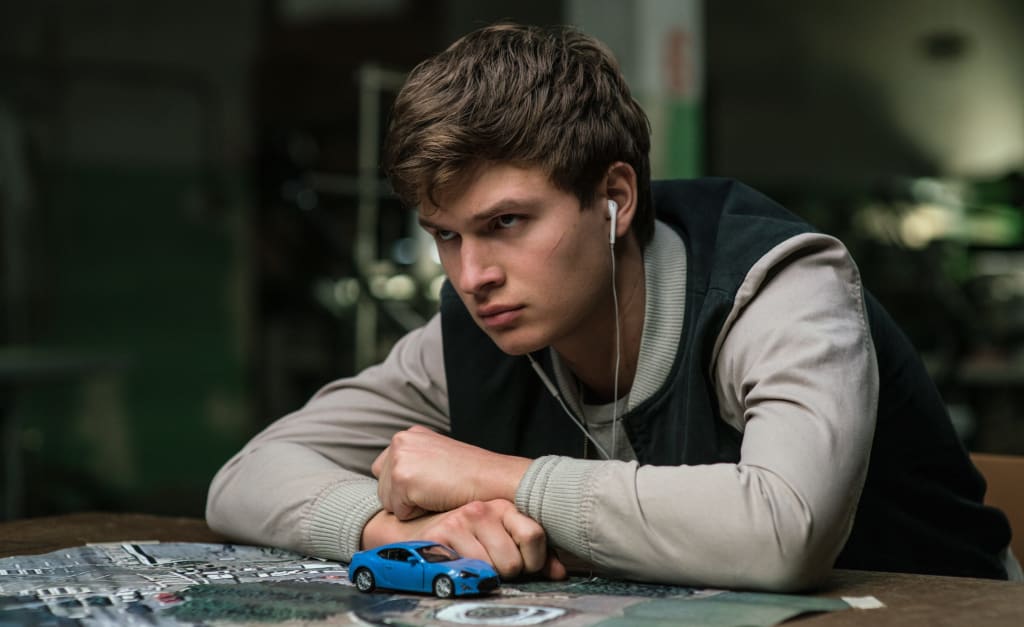‘Baby Driver’ Is a Love Letter to Sound in Cinema
‘Baby Driver’ makes sound an instrumental part of a film that is guaranteed to be a classic

*SPOILERS FOLLOW*
From the opening moments of Baby Driver, the audience can hear an audible ringing sound. The same sound that Baby, the film’s titular character, hears all the time because of an accident he was in as a child, giving him tinnitus. This ringing sound sets up a first-person perspective that the audience is not accustomed to hearing, hearing being the operative word. Throughout the film, what Baby hears, the audience also hears.
The use of sound and music has never before been so instrumental in a movie that seemed to have nothing to do with either of those. On the surface, Baby Driver seems like your typical heist, insane driving, action movie. It is all of those aspects, and so much more. Sound becomes its own character in the film, accurately portraying the moods, feelings, emotions, and beats of every scene in the movie.
Every single action that Baby takes is accompanied by sound, or the absence of it. Baby listens to music 24/7 to deal with the tinnitus, and the music becomes the beat of his life. Throughout the entirety of the film, Baby is walking, dancing, driving, and doing just about everything to the sound of the music. All of his actions are planned and in tune with the song he is currently listening to.
The film uses this sound and music to give us some absolutely spectacular sound mixing and audio engineering that is Academy Award worthy. For example, in more than one truly riveting scene (the movie has quite a few of them), the sound is perfectly attuned to the action that is taking place. During the various heists that ensue, Baby makes sure that the song he is listening to is perfectly timed to what they are doing. Baby even goes so far as to start over and rewind songs that he is listening to, in order to stay on the right track.
In other truly spectacular scenes, the gunfire is synchronized directly with the song at hand. Each shot of each gun is timed with each loud bang in the song currently playing. This gives the action a musical feel. In fact, this whole movie is more musical than the many musicals I’ve seen.
I couldn’t get an exact range but, I would guess that near 80% of the film, if not more, is entirely engrossed with music. It only makes sense, then that Baby would be an audiophile; making beats, mixtapes, having several iPods for different moods, an incredibly vast collection of vinlys, and a penchant for both obscure and classic music.
What is also important is how the film uses the absence of sound. Baby is a character who loves and listens to music 24/7, and Baby is also a character who does not speak much. The absence of talking is important because the music that is playing serves as the basis for what Baby is thinking and feeling. Baby does not need to talk, because the music speaks for him.
When Baby does speak it is with a poise, charm, and cockiness that rivals that of an expert musician playing their favorite instrument. It’s almost as if every time Baby speaks, he’s giving his solo on stage, and everyone can sit back and mesmerize. This is no more clear than when Baby recaps the plan for the heist, or when he woos Deborah.
But when Baby isn’t speaking or listening to music, he is signing with his foster dad, who is deaf. The addition of a deaf foster dad and sign language to a film where sound and music reigns is a critical, intelligent choice. The inability to hear is directly contrasted by the magnificence of being able to hear.
The film sets up the dichotomy between these two extremes, not being able to hear at all and having to listen all the time. Baby does not speak much because he has to listen all the time. He has to listen to the ringing non-stop, and he has listen to music to drown out the ringing non-stop. For Baby, listening is not an option, it’s an unfortunate necessity.
Baby Driver puts forth the importance of sound for Baby, and the audience can feel how important and intrinsic that is to who Baby is. So much so, that when Baby loses the ability to hear near the end of the movie, that loss is extremely heartfelt. It hurt me as a viewer more so than the death of many other characters in other films. To be able to make sound and music that important so that its loss is truly visceral and painful, is nothing short of brilliant.
Baby Driver is technically not a musical, but it emphasizes the importance and purpose of sound and music in a film, in a way in which I have never seen before. Truly, Baby Driver is a love letter to sound and music in cinema.
About the Creator
Brandon Daniel
Staff writer for The Unbalanced. All things culture, entertainment, and everything in between. Find me on all socials at @branddnh. Find me on YouTube at 'Brooke & Brandon'.






Comments
There are no comments for this story
Be the first to respond and start the conversation.